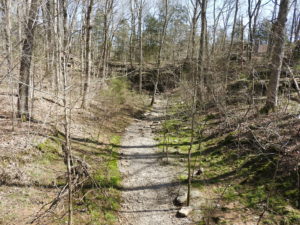 Up until a year or so ago, I used to go hiking a lot. It was not unusual for me to be tromping out in the woods three or four days a week. When I’d travel, I’d often set aside a day to hike. Although the exercise was good, the results when on these unfamiliar trails was not always what I had planned.
Up until a year or so ago, I used to go hiking a lot. It was not unusual for me to be tromping out in the woods three or four days a week. When I’d travel, I’d often set aside a day to hike. Although the exercise was good, the results when on these unfamiliar trails was not always what I had planned.
For instance, while hiking a new (to me) trail in Wisconsin a couple of years ago, I got lost and ended up hiking nine miles instead of the four I had planned to hike. Another time, in Smoky Mountain National Park, I hiked a four mile-long loop trail that I swear went straight up for three of the four miles. At one point, I had resigned myself to living out my final hours sitting on a log rather than continuing the uphill slog. It was during that hike that I realized I mostly like leisurely walks through the woods over death-defying hikes that cause more stress than they relieve.
This last point is an important one, and one I was reminded of today when I hiked four miles on the Cedar Forest Trail in Cedars of Lebanon State Park in Wilson County, Tennessee. For me, hiking has always been a way to get some exercise while also addressing the stresses of everyday life. The problem is that I often allow those stresses to stop, rather than motivate, me from going out into the woods to hike. I use things like relationship issues, career headaches, money problems, etc. to keep me out of the woods. Instead, these are the very things that should drive me to hike more. Every time I hit the trail, I can feel whatever stresses I’m experiencing lift and lessen. The solitude of the woods helps to clear my head and gives me a new perspective. In other words, hiking in the woods is a prescription to combat everyday stresses, not a luxury that can be avoided due to those stresses.
In her book, The 3-Day Effect, author Florence Williams makes the case that time spent in the wild not only can help us relieve stress, but can also fortify us against future stress. Williams conducted outdoor, “in the wild,” experiments with veterans suffering from PTSD, female victims of physical and sexual abuse, and, in an unusual but very personal experiment, herself, while she was going through an unexpected and unwanted divorce. In each case, the subjects of the experiments found that their time in the outdoors relieved their stress (whatever their particular stress might have been), and it also helped them to deal with the cause of their stress when they returned back to their lives.
I like to go out into the woods for a couple of hours and just walk. I find the time relaxing, invigorating, and recharging. But to get maximum benefit from being out in nature, Williams suggests spending a minimum of three days in the wild. Staying out even longer can be even more beneficial, but there are diminishing returns the longer you stay out.
I have a bad habit of staying cooped up in the house. It’s where I write, and I’m committed to spending more time writing in the future. However, that doesn’t mean I can’t be just as committed to spending time outdoors, hiking, walking, or even just sitting. If Williams’ 3-Day Effect theory is right (and I believe it is), being out in nature will be good for my health and for my writing.

How Much Nature Is Enough? 120 Minutes a Week, Doctors Say https://www.nytimes.com/2019/06/13/health/nature-outdoors-health.html?fbclid=IwAR1wNAgqUP4pIC8HDQz3GHPejKdZfek0BJeVS6K3AuwICF3wMUmGXMHrdlE
The Nature Cure https://www.outsideonline.com/2393660/science-newest-miracle-drug-free?fbclid=IwAR32eI_GyvxaFuGAYdzAiwu21EwjjxSEFOizY3tAJx6O769nYL64nT-y1fg